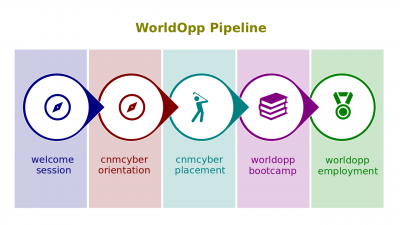Difference between revisions of "Applicant Selections"
(→See also) |
|||
| Line 1: | Line 1: | ||
| + | [[File:Careerprise td.png|200px|thumb|[[Careerprise]]'s trade mark]][[File:Educaship-pipeline.png|400px|thumb|right|[[WorldOpp Pipeline]]]][[Employment Essentials]] is the first [[presentation]] in the [[Introduction to Employment]] lecture. The lecture itself is the first in [[WorldOpp Orientation]]. Consequently, the ''[[WorldOpp Orientation|Orientation]]'' is the first stage of [[WorldOpp Pipeline]]. | ||
| + | |||
| + | This wikipage presents its full script and those test questions that are related to that presentation. | ||
| + | |||
| + | |||
| + | ==Script== | ||
| + | The video of the presentation is published at https://youtu.be/LJBr1eVsMfQ (5:52). Here is its full text. | ||
| + | |||
| + | ===Overview=== | ||
Assuming we have got potential candidates, the next step is to screen them. Screening is the evaluation or investigation of a source as a part of methodical survey to assess suitability of a particular role or purpose. Technically for our occupation in our industry. There are many different techniques and tools that can be used for source screening. One of the most popular is job interview but here it is very rear for a candidate to get a job immediately, of course when the applicants submit their credentials it makes sense to take a look at them, you can check for mistakes, and certifications claimed by the applicant in the databases, or trade certificates if this person is listed on the website, but eventually job interview is like somewhere 99.5% job candidates will have some kind of a job interview. Normally what we say job interview should be called employment interview because job interview can be for a particular job or for a particular employment or it could be about like general jobs in the company. | Assuming we have got potential candidates, the next step is to screen them. Screening is the evaluation or investigation of a source as a part of methodical survey to assess suitability of a particular role or purpose. Technically for our occupation in our industry. There are many different techniques and tools that can be used for source screening. One of the most popular is job interview but here it is very rear for a candidate to get a job immediately, of course when the applicants submit their credentials it makes sense to take a look at them, you can check for mistakes, and certifications claimed by the applicant in the databases, or trade certificates if this person is listed on the website, but eventually job interview is like somewhere 99.5% job candidates will have some kind of a job interview. Normally what we say job interview should be called employment interview because job interview can be for a particular job or for a particular employment or it could be about like general jobs in the company. | ||
| Line 12: | Line 21: | ||
We are ready to move to services of recruiters and it will finish our lecture. | We are ready to move to services of recruiters and it will finish our lecture. | ||
| − | |||
| − | |||
| − | |||
| − | |||
| − | |||
| − | |||
| − | |||
| − | |||
| − | |||
| − | |||
| − | |||
| − | |||
| − | |||
| − | |||
===Summary=== | ===Summary=== | ||
Revision as of 15:47, 25 January 2019

Employment Essentials is the first presentation in the Introduction to Employment lecture. The lecture itself is the first in WorldOpp Orientation. Consequently, the Orientation is the first stage of WorldOpp Pipeline.
This wikipage presents its full script and those test questions that are related to that presentation.
Script
The video of the presentation is published at https://youtu.be/LJBr1eVsMfQ (5:52). Here is its full text.
Overview
Assuming we have got potential candidates, the next step is to screen them. Screening is the evaluation or investigation of a source as a part of methodical survey to assess suitability of a particular role or purpose. Technically for our occupation in our industry. There are many different techniques and tools that can be used for source screening. One of the most popular is job interview but here it is very rear for a candidate to get a job immediately, of course when the applicants submit their credentials it makes sense to take a look at them, you can check for mistakes, and certifications claimed by the applicant in the databases, or trade certificates if this person is listed on the website, but eventually job interview is like somewhere 99.5% job candidates will have some kind of a job interview. Normally what we say job interview should be called employment interview because job interview can be for a particular job or for a particular employment or it could be about like general jobs in the company.
Employment interview is the interview that consist of a conversation between a job applicant and one or more representatives of the employer which is conducted to;
- a. Assess whether the applicant may be hired
- b. Negotiate conditions of this hiring.
Job interviews consist of general questions like, tell me about yourself. Some job interviews are more technical, for instance, are you familiar with convers tech? What do you know about this? What do you like about this? When do you prefer to use that? Some job interviews can be more technical interviews rather than the job interview. Job interview is not the only way to assess the person, situational job judgment test is a substantive selection test that ask applicants how they will perform in a variety of situation. And their answers are then compared to the answers of high performing employees. Some situational job judgement tests can be included in the job interview as well instead of given like separate test. Most of the small companies searching for employees will probably do that. Bigger employers tend to have a more developed process, smaller employers may have like a very easier, less complicated recruitment or screening process.
Another tool can be a work sample test, here basically a job candidate is offered to perform as they will perform on the work, it could be assessment center, an offside place where candidates are given performance situation tests designed to evaluate their managerial potential. Why managerial? This is because assessment centers are expensive.
We are ready to move to services of recruiters and it will finish our lecture.
Summary
Quiz questions
- Every statement below is split into one true and one false question in the actual exam.
See also
- CNM Digital Essentials. Another presentation of Welcome to Friends Of CNM.
- Friends Of CNM Essentials. Another presentation of Welcome to Friends Of CNM.
